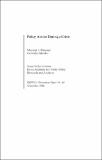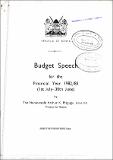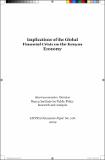| dc.description.abstract | Good policy making is an art. It involves a substantial element of personal judgement about risks and consequences of alternative courses of actions and decisions. It is also a science because it requires systematic gathering and analysis of evidence about a policy issue, and rational assessment of costs and benefits of various ways of addressing the issue. However, in a crisis, there is little time to gather evidence or to search for imaginative solutions to a problem. There is a tendency, in such a situation, to act under pressure rather than on the basis of evidence, analysis or informed judgement. Furthermore, a crisis often creates a situation in which policy makers receive all sorts of advice. This paper discusses a set of concepts, originating mainly from economics, that can be used to assess soundness of policy and advice, particularly during a crisis. These are concepts of rationality, sustainability, inclusiveness, feasibility, practicality and tipping, which can be used in decision making in normal and crisis times to reduce risks of disastrous advice or policy. | en |




